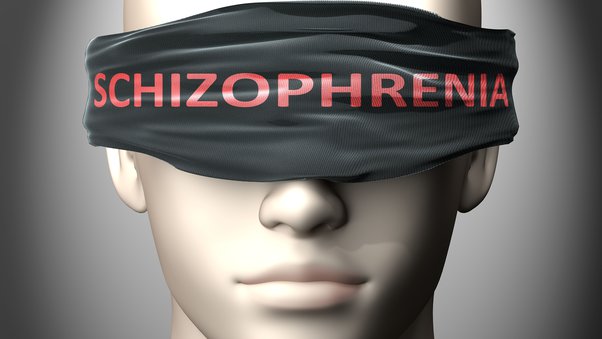Who does not become schizophrenic?
Why are congenitally blind people not schizophrenic?

Schizophrenia is a disorder in which the decision-making region of the person's brain is impaired. The frontal region of the brain of schizophrenic patients, the decision-making region, does not work well. The perceiving areas of the brain and the interpreting areas are disconnected from each other. Normally, the human brain does a 'reality test'. In schizophrenia, the brain cannot perform the reality test, believes the ridiculous thoughts that come to mind, and writes scenarios about them. Recent studies reveal that schizophrenia is a brain disease, not a mental illness.
Schizophrenia is a serious mental disorder in which people interpret reality abnormally. Schizophrenia may result in some combination of hallucinations, delusions, and extremely disordered thinking and behavior that impairs daily functioning, and can be disabling. People with schizophrenia require lifelong treatment.
Schizophrenia is characterized by symptoms such as loss of contact with reality, and auditory and visual hallucinations. Despite numerous studies, the exact cause of the disease still remains a mystery. The interesting thing is that people who are visually impaired from birth do not suffer from schizophrenia. Could being blind from birth protect people from schizophrenia?
What is a schizophrenic person like?
Schizophrenia usually involves delusions (false beliefs), hallucinations (seeing or hearing things that don't exist), unusual physical behavior, and disorganized thinking and speech. It is common for people with schizophrenia to have paranoid thoughts or hear voices.
Throughout medical history, even a congenitally blind person has not been found to have schizophrenia, and doctors can't figure out exactly why. Although doctors have developed various explanations for this issue in the past years, none of the doctors can explain how being visually impaired from birth creates a protective shield against schizophrenia.
King's College psychiatrist Tom Pollack attributes the disorder to a limitation in the brain's ability to model things in the environment and predict what will happen. “The point we're trying to get to is that there has to be something different in the inner world description and balance of people with congenital blindness,” Pollack says. In a sense, this balance protects itself against the errors and false inferences that occur in schizophrenia and psychotic disorders.
According to psychiatrist Steve Silverstein of the University of Rochester, people who are congenitally blind are experts at things like selective perception, which people with schizophrenia often have trouble with. I think there are at least 20 different things that people with congenital blindness do better than average people in the general population. These 20 different things are in the same domain as the things people with schizophrenia have more difficulty with.
A study by the University of Western Australia provides interesting evidence that congenital blindness, or blindness that occurs shortly after birth, is protective against schizophrenia. This unusual discovery has stunned scientists, suggesting it will help to better understand what causes schizophrenia.
Researchers from the University of Western Australia analyzed data collected from the health records of nearly half a million people in Western Australia between 1980 and 2001 and found no one diagnosed with visual impairment who was subsequently diagnosed with schizophrenia.
Professor at the University of Western Australia. “If we can understand what causes the protective effect and reproduce it artificially, we can minimize the symptoms that can lead to schizophrenia or prevent the development of schizophrenia with early intervention,” says Vera Morgan.
The Curious Link Between Blindness and Schizophrenia
This might blow your mind: No one who was born blind has ever been diagnosed with schizophrenia. Now, that's a mic drop moment for brain researchers.
https://www.psycom.net/blindness-and-schizophrenia
